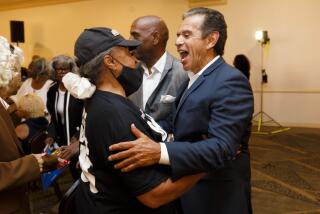L.A. Latinos Bask in Glow of Victory
It’s not exactly like the Mexican soccer team winning the World Cup, but Wednesday’s realization that Los Angeles had elected its first Latino mayor in more than a century provoked a muted pride and celebration among Latinos.
Like the rest of Los Angeles, they went to work, watched the Dodgers, and sometimes expressed cynical thoughts about all politicians.
At Dodger Stadium, a big sixth inning for the visiting team did not dampen John Delgado’s enthusiasm.
“I’m happy, very happy that I woke up this morning ... and that Villaraigosa won in a landslide for mayor,” said Delgado, 53, of West Covina, who also said he attended junior high school with the new mayor-elect. “I’m so proud that a Mexican American from East L.A., you know, became mayor of Los Angeles after 100 years. Over 100 years.”
Wearing a Dodger blue visor and nursing a beer, Delgado said he recalled with bitterness the 1993 mayoral race, when City Councilman Michael Woo ran against Richard Riordan.
“I mean, being a Chicano ... I thought, ‘A Chinese mayor before a Chicano mayor in L.A.?’ I was devastated,” Delgado said. So was Woo, who lost by a wide margin.
Miles away, at Venice Boulevard and Vermont Avenue, painter Juan Bautista, an undocumented immigrant from Mexico, was more subdued.
“I liked it,” Bautista said. “Now maybe those on top will pay more attention to us.... [But] I don’t really believe in politics much.”
Meanwhile, Esteban Perez, a 24-year-old car washer here illegally from the state of Puebla, Mexico, was only vaguely aware that an election for mayor had taken place and the victor was Latino.
He echoed many recent immigrants by saying: “We don’t pay a lot of attention to politicians because we don’t think they can do a lot for us.”
Antonio Villaraigosa’s win continues a trend of Latino political candidates gaining offices, from school boards to city councils to water district boards, in districts where Latinos are not the majority of voters, said Jaime Regalado, who is director of the Edmund G. “Pat” Brown Institute of Public Affairs at Cal State L.A.
“I think we’ve arrived in a place, even without Antonio’s victory, where we’ve never been in the history of American cities,” Regalado said.
Yet Villaraigosa’s election also seemed to emphasize that Los Angeles is a city of nonparticipants, Latinos among them.
Latino turnout hit a record high: An estimated quarter of all votes cast in the election -- about 115,000 -- came from Latinos, according to a Los Angeles Times exit poll.
Yet that number was minuscule compared to their numbers citywide; close to 1.8 million Los Angeles residents are Latino, according to the 2000 U.S. census.
Manuel Nunez, an 18-year-old student at the East L.A. Occupational Center, was one of those who could have voted but didn’t.
“Most Latinos I know say, ‘Why even vote? It’s just going to be the same thing,’ ” said Nunez, dressed in a black leather jacket, a studded belt and black boots.
A fellow student, Fabian Arguello, agreed: “It doesn’t matter who you get [as mayor]. You’re going to get screwed over, even if it’s by your own ethnicity.”
Only one Spanish-language television station, Channel 22, carried Villaraigosa’s first news conference live as mayor-elect Wednesday morning.
Other stations featured their usual morning gossip fests, soap operas and other programming.
Among the slew of Spanish-language radio stations in Southern California, only two have a news talk show.
These divided their time Wednesday between Villaraigosa and other issues.
Univision’s 1020 AM morning show discussed Villaraigosa’s election as part of general news, then broke at 9 a.m. for an Angel baseball pregame show.
Gerardo Lorenz, host of the Radiovisa 830 AM program “Gerardo por la Manana,” pointed to Villaraigosa’s victory as a celebration of those Latinos who became citizens, registered and voted.
“Most of the callers were saying that this is great. They felt that there was a hope that this man could become a great leader,” Lorenz said in an interview. “They also said that they hope he doesn’t fail us.”
Lorenz’s regular feature, “Question of the Day,” was: Why was it so hard for Latino immigrants to decide to become U.S. citizens, and thus be able to vote?
Listeners’ responses showed the complicated yearnings of many immigrants from Mexico and Central America.
“We’re from countries where voter fraud or dictatorships were what governed,” Lorenz said. Stung by negative political experiences back home, many immigrants avoid politics in their adopted country, he said.
At the same time, Lorenz said, “many people agreed that we don’t become [U.S.] citizens because we dream of going back home to our own countries.”
By the 8 o’clock hour, talk of politics on Lorenz’s show had given way to a discussion about whether pedophiles should be chemically castrated. That was followed at 9 by a fortuneteller.
More to Read
Sign up for Essential California
The most important California stories and recommendations in your inbox every morning.
You may occasionally receive promotional content from the Los Angeles Times.











